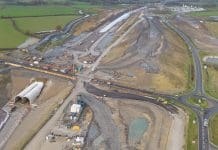The government has announced a £96bn Integrated Rail Plan to deliver faster and better journeys to people more people across the North and Midlands area
The Integrated Rail Plan (IRP) will transform connectivity across east to west and north to south links, through building 3 new high-speed lines and improving rail services to and between the East and West Midlands, Yorkshire, and the North West.
The high-speed lines include:
- Northern Powerhouse Rail (NPR): Connecting Leeds and Manchester in 33 minutes, compared to the current 55 minutes.
- HS2 East will run directly from central Nottingham to Birmingham in 26 minutes, compared to the current 1 hour 14 minutes, and from central Nottingham to London in 57 minutes. HS2 will also run from London to Sheffield in 1 hour 27 minutes.
- HS2 West will run from London to Manchester in 1 hour 11 minutes and from Birmingham to Manchester in 41 to 51 minutes compared to 86 minutes today.
To most destinations on the HS2 and NPR core routes, journey times will be the same as, similar to, or faster than the previous proposals.
Improvements are being delivered for communities across the Midlands and North up to a decade sooner and to more places.
Under earlier plans, smaller towns on existing main lines such as Doncaster, Grantham, Huddersfield, Wakefield, and Leicester would have seen little improvement, and in some cases, even their services cut back.
The IRP will protect and improve these crucial links and will deliver improvements with far less disruption to local communities.
Rail passengers will benefit from tangible changes in local train lines and inter-city links, seeing more seats, shorter journeys, and more frequent and more reliable services.
As well as the new high-speed lines, the IRP fully electrifies and upgrades 2 diesel main lines: the Midlands Main Line and the Transpennine Main Line, alongside upgrading the East Coast – with higher speeds, power improvements, and digital signalling to slash journey times.
‘Enabling people to move more freely across the country’
Prime minister Boris Johnson, said: “My mission is to level up opportunity across our country, which is why we’re making train journeys faster and more reliable through the biggest ever public investment in our rail network.
“This is because better rail connections are essential for growing local economies and businesses, and our Integrated Rail Plan will deliver better services to more people, more quickly.
“Levelling up has to be for everyone, not just the biggest cities. That’s why we will transform transport links between our biggest cities and smaller towns, ensuring we improve both long-distance and vital local services and enabling people to move more freely across the country wherever they are.”
‘The largest single government investment ever made’
Transport secretary Grant Shapps, commented: “Our plan is ambitious, deliverable, and backed by the largest single government investment ever made in our rail network. It will deliver punctual, frequent, and reliable journeys for everyone, wherever they live.
“Just as the Victorians gave this country our railways nearly 200 years ago, this Integrated Rail Plan will create a modern, expanded railway fit for today and future generations.
“Significant improvements will be delivered rapidly, bringing communities closer together, creating jobs and making places more attractive to business, and in doing so, rebalancing opportunity across the country.
“Our plans go above and beyond the initial ambitions of HS2 and Northern Powerhouse Rail by delivering benefits for communities no matter their size, right across the North and Midlands, up to 10 to 15 years earlier.
“For NPR, we have chosen the first of the options put forward by Transport for the North (TfN) in 2019, a mixture of newbuild high-speed and upgraded conventional line.
“TfN’s options for full newbuild high-speed line were carefully studied but would have made journeys between Leeds and Manchester only 4 minutes faster at a cost of an extra £18 billion and taken up to a decade longer to deliver.”
The package of investment includes:
- Three new high-speed lines, complete HS2 from Crewe to Manchester, with new stations at Manchester Airport and Manchester Piccadilly.
- A new high-speed line between Birmingham and East Midlands Parkway. Trains will continue to central Nottingham, Derby, and Sheffield on an upgraded and electrified Midland mainline.
- Delivering NPR through a new high-speed line between Warrington, Manchester, and Marsden in Yorkshire as in the first of the options originally put forward by TfN in 2019.
- A study to look at the best way to take HS2 trains to Leeds, including capacity at Leeds Station.
- The upgrading or electrification of 3 existing lines, including the complete electrification of the Midland Main Line from London to Nottingham, Derby, and Sheffield.
- A programme of rapid upgrades to the East Coast Main Line to the East Midlands, Yorkshire, and the North East. Journey times will be up to 25 minutes faster than current times.
- A full electrification and upgrade of the Transpennine Main Line between Manchester, Leeds, and York as part of delivering the first phase of NPR, installing full digital signalling, with longer sections of three- and four-tracking to allow fast trains to overtake stopping services, and increase through passenger services by 20%.
- An additional £625 million in new funding has also been confirmed to progress the Transpennine Route Upgrade.
In total, more than 75% of the country’s main lines will be electric, to meet the ambition of removing all diesel-only trains from the network by 2040, as part of the government’s commitment to reach net zero by 2050.
Using a mixture of new-build high-speed lines and upgraded conventional lines, the new plans were drawn up after it became clear that the full HS2 and NPR schemes as originally proposed would have cost up to £185 billion and not entered service until the early to mid-2040s.
Building on the expert findings of wide-ranging internal and independent analysis, including from the National Infrastructure Commission, the plan will deliver better outcomes for passengers faster and more efficiently than under original plans for the schemes.
‘Goalposts moved at the eleventh hour’
Matthew Fell, CBI chief policy director, said: “High-quality infrastructure is fundamental to raising living standards and levelling up the country.
“The Integrated Rail Plan is a significant investment that will go some way towards modernising our ageing rail networks and can be delivered at pace.
“But businesses across the Midlands and Northern England will be justifiably disappointed to see the goalposts have moved at the eleventh hour, and concerned that some of the areas most sorely in need of development will lose out as a result of the scaled back plans.”
‘Scheme has been drastically watered down’
Paul Robinson, UK rail lead at Gleeds, said: “While we welcome the long-awaited publication of the Integrated Rail Plan, the continued delays have done nothing but create uncertainty, leading to widespread and damaging speculation about the fate of schemes like HS2, Northern Powerhouse Rail and the Midlands Rail Hub.
“This has only been exacerbated by the lack of clarity around the future of individual projects of late. Take HS2, for example. If the scope had been delivered in full, this would have benefited the entire country but with the Eastern leg removed the areas that needed it the most are being cut out.
“The continuous adjustments to funding, priorities, and overarching policy in preceding years have created inefficiencies and cost the tax-payer millions while delivering very little, so we have all been waiting for a brave, integrated and above all consistent rail plan to shape the next decade and beyond. While the IRP does at least provide some direction, it is not the ‘infrastructure revolution for this country’ that Boris Johnson claimed would be coming.
“He himself said that now was the time to invest in Northern Powerhouse Rail so I am disappointed, although not entirely surprised, to see that the scheme has been drastically watered down. We fully support the notion of devolved investment but it’s important that words translate into action.
“The NPR represented a real opportunity to support the delivery of the levelling-up agenda by connecting the major economic centres of the North. It promised to reinvigorate under-served communities, generating opportunity, attracting investment, creating jobs and ultimately, allowing this part of the country to realise its vast potential – if done right.
“Ultimately, having at last set out its objectives, such as they are, I hope that those charged with bringing them to fruition will strive to put passengers first, focusing on and rewarding outcomes instead of simply encouraging a race to the bottom on price which benefits no one.”







![[VIDEO] HS2 completes 4,600-tonne viaduct slide across M6 The HS2 team completed a 17-hour long operation sliding the viaduct structure across the M6 without closing the motorway](https://www.pbctoday.co.uk/news/wp-content/uploads/2025/12/M6-South-viaduct-slide-taking-place-across-a-live-motorway-December-2025-218x150.jpg)






